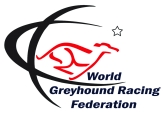|
CGRF antidoping rules
A)
Rules of drug administration
-
except the the
ordinary food and nutrients fed by the mouth - no medicine, chemical
or substance is allowed to affect the speed, stamina, courage and
conduct of a greyhound
-
a racing greyhound
must be fit for racing and fully recovered from any illness, injury,
or other veterinary problems
- minimum
withdrawal period after the last treatment (since last medicine
or chemical has been administered): 96 hours prior to a race
-
only a veterinary
surgeon can administer
Corticosteroidal hormones, non-steroidal anti-inflammatory drugs
(the NSAID group = painkillers), antibiotics
to a racing
greyhound only during illness and / or injury
-
minimum
withdrawal period after the last treatment (since last medicine
or chemical has been administered): 288 hours prior to a race
-
only a veterinary
surgeon can administer anabolic
steroids and/or androgenic hormones
to a racing
greyhound only during illness and / or injury
-
a greyhound owner
of a greyhound that recovered from a medical problem must hand in a
medical report, signed by a veterinary surgeon, stating a list of
administered drugs, lenght of use, amount of used drugs etc.
-
a track veterinary
supervisor can require a full account of the medical history of a
given greyhound from the greyhound owner. On the basis of the
medical report an authorized veterinary surgeon may decide whether
the greyhound can race or not
|
|
B) Antidoping tests
- the greyhound owner
agrees with executing antidoping tests of a given greyhound by
applying for registration of a greyhound
-
it is the right of
the Racing manager to decide when an where an anti-doping test will
take place
-
only the
authorised persons (veterinary surgeon and any persons authorised by
the Racing Manager) are allowed to arrange such tests
-
the Racing manager
ensures that the equipment for taking samples, sealing and
delivering of the samples is accesible at every CGRF eventů
-
an authorised
veterinary surgeon must be assisted by at least one approved CGRF
steward when executing an antidoping test
-
refusing an
antidoping test is considered as a positive test result
|
|
C) List of doping
substances, chemicals, medicines
-
These chemicals,
substances or medicines are considered as doping:
-
medicine or chemical influencing the central and the peripheral
nerve system
-
medicine
or chemical influencing the vegetative nerve system
-
medicine
or chemical influencing the digestive system
-
medicine
or chemical influencing the heart and the blood system
-
medicine
or chemical influencing muscles
-
medicine
or chemical causing antipyretic and analgetic effects
-
medicine
or chemical influencing the blood condensabilty
-
cytostatic
agents
-
antihistamins
-
diuretic
stimulants
-
local
anesthetics
-
myorelaxantia
-
medicine
or chemical stimuling breathing
-
sexual
hormons ( with the exception of chemicals supressing the heat)
-
anabolics
-
corticoids
-
endocrines
and the syntetic analogies
2.
any confirmed amount of chemicals, substances or medicines described in
the point 6 is considered
to be a positive result of the antidoping test,
with the exception of theobromin – a tolerated level of this chemical is
2000 nanograms/ml
|
|
D)
Breaching
of rules of drug administration and positive anti-doping tests
A positive antidoping test results and / or violation of rules of drug
administration can lead to:
-
disqualification of
the greyhound from the race by return (including removing the prize
money, cups etc.)
-
suspension of the
greyhound from races for a minimum period of three years
-
suspension of the
greyhound owner from taking part in races for a minimum period of
three years
-
a greyhound owner,
whose greyhound´s antidoping test is positive, must pay the expences
for the testing. If a greyhound´s antidoping test is negative, all the
expences are paid by the CGRF
-
the CGRF presidium
may impose heavier penalties for anyone who violates these rules
|
|

